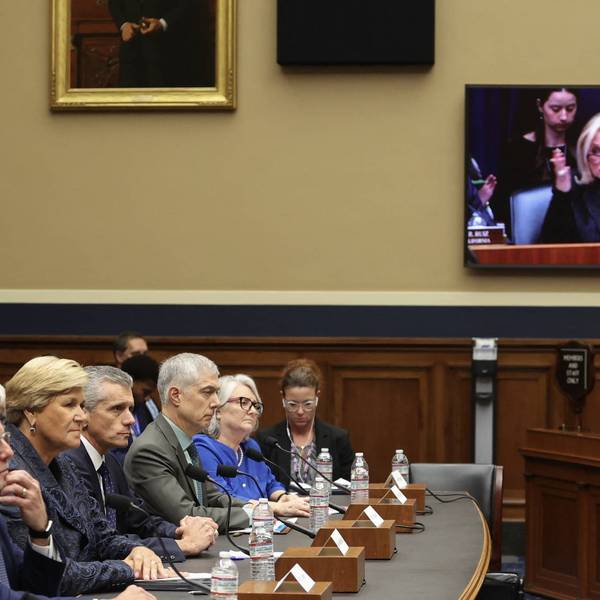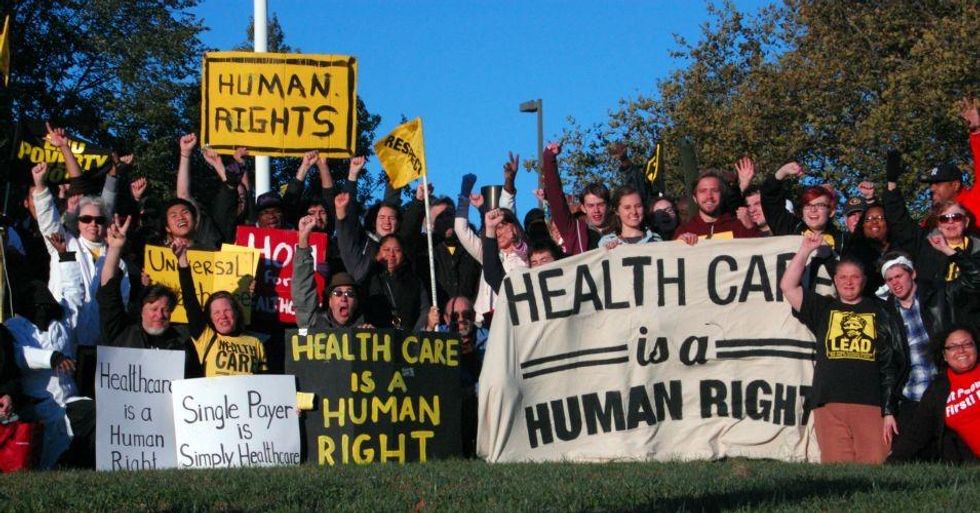The health insurance giant Anthem announced Friday that it is buying its behemoth rival Cigna for $54.2 billion, launching the largest such merger the country has ever seen and reducing the number of major U.S. insurers to a paltry three.
Analysts and human rights campaigners warn that the move is poised to further slash access to healthcare and hike prices across the country, illustrating the problems with the for-profit model in terms of delivering vital services.
The mega deal comes less than a month after insurance giant Aetna acquired Humana for $37 billion, part of a nationwide push to consolidate in what the Wall Street Journal referred to earlier this year as an "oligopoly wave."
The Anthem and Cigna merger is expected to be finalized in 2016, after which the joint company will provide coverage for at least 53 million people.
Numerous studies show that insurance mergers lead to higher premiums, including a 2012 analysis of a 1999 merger between Aetna and Prudential, as well as a report released in February which showed having more, not less, insurers in the insurance marketplace established by the Affordable Care Act leads to lower premiums.
Moreover, the mergers are taking place in a country that already has a dismal record with providing real care. A report (pdf) released last year by the Commonwealth Fund finds that the U.S. healthcare system is already the most expensive in the world yet delivers the worse care among 11 industrialized nations.
Cait Vaughan, a Healthcare Is a Human Right organizer with the Southern Maine Workers' Center, told Common Dreams that Friday's merger underscores the fact that the Affordable Care Act model "is still a for-profit system that is not determined by our needs, but determined by the desires and profit margins of huge conglomerates."
Vaughan emphasized that, in today's "medical industrial complex," people are made "incredibly wealthy off of us being sick and limiting very basic access to healthcare while increasingly shrinking our ability to make choices." During a presidential campaign cycle where we are "hearing a lot about how rich people control policy and elections," Vaughan said that it is vital to talk about the control of the wealthy over one of the most basic human rights: healthcare.
Dr. David Himmelstein, co-founder of Physicians for a National Health Program, told Common Dreams that the wave of mergers will turn insurance giants into "essential monopolies" that make a significant profit from public tax dollars.
"Much of their revenue comes from the government that pays hundreds of billions annually in premiums for private 'Medicare Advantage' plans, Medicaid managed care plans, and much of the premiums for the private plans bought on [ACA] insurance exchanges," said Himmelstein. "Much of this money is wasted; Anthem and Cigna have overhead that's nearly tenfold higher than traditional Medicare."
Human rights campaigners say that public dollars should not be used to enrich these giant companies, but rather, should go towards a universal, single-payer healthcare system in which the profit motive is cut out of the equation, and everyone is included.
But Brian Quinn, a law professor at Boston College, told the Washington Post that the frenzy of mergers could signal that the country is moving in the opposite direction: "It's a little ironic I suppose that--over time--we may find ourselves moving towards a single payer healthcare system, but rather than it being government run, it may well be a small number of private, highly-regulated insurance companies."
But analysts say that these companies, in fact, are not "highly regulated" at all.
"Just this month, the insurers' lobbying group hired as their new CEO Marilyn Tavenner, who as head of Medicare and Medicaid was responsible for regulating them until this spring," said Himmelstein. "These monopolies are lightly regulated, and have used their enormous financial and political clout to avoid real oversight."




